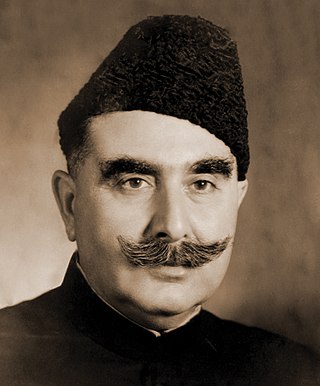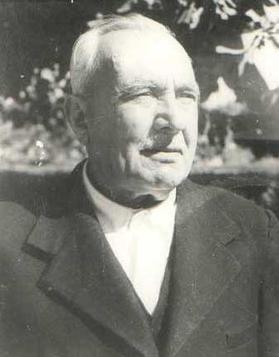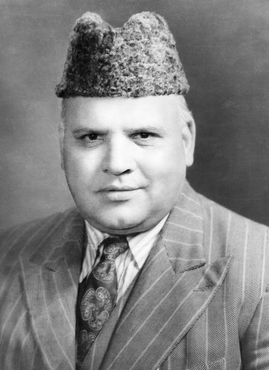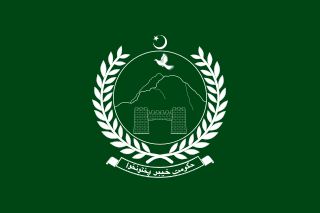
Abdul Ghaffār Khān, also known as Bacha Khan or Badshah Khan was a Pashtun independence activist, and founder of the Khudai Khidmatgar resistance movement against British colonial rule in India.

The Pakistan Movement was a political movement in the first half of the 20th century that aimed for the creation of Pakistan from the Muslim-majority areas of British India. It was connected to the perceived need for self-determination for Muslims under British rule at the time. Muhammad Ali Jinnah, a barrister and politician led this movement after the Lahore Resolution was passed by All-India Muslim League on 23 March 1940.

Khan Abdul Wali Khan was a Pashtun Pakistani democratic socialist politician who served as president of Awami National Party. Son of the prominent Pashtun nationalist leader Abdul Ghaffar Khan, Wali Khan was an activist and a writer against the British Raj like his father.

Sardar Abdur Rab Nishtar was a Pakistani independence activist and politician from the North-West Frontier Province. He served as the first Minister of Communications of Pakistan from August 1947 to August 1949 and then as the second Governor of West Punjab from August 1949 to November 1951.

Khan Abdul Jabbar Khan, popularly known as Dr. Khan Sahib, was a pioneer in the Indian Independence Movement and later, a Pakistani politician. He was the elder brother of the Pashtun activist Abdul Ghaffar Khan, both of whom opposed the partition of India. Upon independence, he pledged his allegiance to Pakistan and later served as the First Chief Minister of West Pakistan.

Khudai Khidmatgar was a predominantly Pashtun nonviolent resistance movement known for its activism against the British Raj in colonial India; it was based in the country's North-West Frontier Province.

Muhamad Yusuf Khan Khattak was a Pakistani politician, left-wing intellectual, lawyer, and noted Pakistan Movement activist from Khyber Pakhtunkhwa.

Khan Abdul Qayyum Khan Kashmiri was a major figure in British Indian and later Pakistan politics, in particular in the North-West Frontier Province, where served as the deputy speaker of the provincial assembly, first Chief Minister of North-West Frontier Province and served as Interior Minister of Pakistan in the central government from 1972 to 1977.
The Babrra Massacre was a mass shooting on 12 August 1948 in the North-West Frontier Province (NWFP) of Pakistan. According to official figures, around 15 protestors were killed while around 40 were injured. However, Khudai Khidmatgar sources maintained that around 150 were killed and 400 were injured.

Amin ul-Hasanat, better known as the Pir of Manki Sharif qv, was the son of Pir Abdul Rauf and an Islamic religious leader in the North-West Frontier Province (NWFP) of British India. After joining the All-India Muslim League in 1945, he was noted for his campaign in the provincial referendum held in early part of 1947, that saw the NWFP become part of Pakistan rather than India. He was popularly known as ''Fateh-e-Referendum''.

General elections were held in Pakistan on 7 December 1970 to elect members of the National Assembly. They were the first direct general elections since the independence of Pakistan and ultimately the only ones held prior to the independence of Bangladesh. Voting took place in 300 general constituencies, of which 162 were in East Pakistan and 138 in West Pakistan. A further thirteen seats were reserved for women, who were to be elected by members of the National Assembly.
Fida Mohammad Khan was a Pakistani conservative economist and lawyer who served as the Governor of the Khyber-Pakhtunkhwa Province under the military government of General Muhammad Zia-ul-Haq from 1986 until 1988. He was one of the founding members of the All-India Muslim League for its Northwest Frontier Province chapter before 1947.

The Provincial Assembly ofKhyber Pakhtunkhwa is a unicameral legislature of elected representatives of the Pakistani province of Khyber Pakhtunkhwa, which is located in Peshawar, the provincial capital. It was established under Article 106 of the Constitution of Pakistan, having a total of 145 seats, with 115 general seats, 26 seats reserved for women and 4 reserved for non-Muslims.
Qazi Ataullah Khan (1895-1952) was a Pashtun lawyer, writer, activist, and politician.

Abdul Hamid Khan Bhashani, often shortened as Maulana Bhashani, was a Bengali politician. His political tenure spanned the British colonial India, Pakistan and Bangladesh periods. Maulana Bhashani was popularly known by the honorary title Mozlum Jananeta meaning leader of the oppressed for his lifelong stance advocating for the poor. He gained nationwide mass popularity among the peasants and helped to build the East Pakistan Peasant Association. Owing to his political leaning to the left, often dubbed Islamic Socialism. he was also called 'The Red Maulana'. He is considered as one of the main pillars of Bangladeshi independence of 1971.

Awami League, officially All-Pakistan Awami League and All-Pakistan Awami Muslim League before 1955, was a Pakistani political party founded by Huseyn Shaheed Suhrawardy in February 1950. Pir of Manki Sharif and Khan Ghulam Mohammad Khan from the North-West Frontier Province (NWFP) joined it soon afterwards.

The North-West Frontier Province referendum was held in July 1947 to decide whether the North-West Frontier Province of British India would join the Dominion of India or Pakistan upon the Partition of India. The polling began on 6 July and the results were made public on 20 July. Out of the total population of 4 million in the NWFP, only 572,798 were eligible to vote, of whom only 51.00% voted in the referendum. 289,244 (99.02%) of the votes were cast in favor of Pakistan and only 2,874 (0.98%) in favor of India.
Nawab Mohammad Khan Jogezai was a Pashtun tribal elder and the only representative from Baluchistan Province to the Constituent Assembly of Pakistan.
Sardar Asad Ullah Jan Khan was a Pakistani Pakhtun politician from Kulachi, who represented North-West Frontier Province in the Constituent Assembly of Pakistan. Chieftain of the Gandapur tribal segment, Khan commanded influence in the society; besides, he was a local land magnate.
Abdul Aziz Khan Kaka (1906–1987) was a member of the Khudai Khidmatgar Movement from Zaida Kallay, Swabi who defeated the Imperial Crown's Political Agent, Sir Sahibzada Abdul Qayyum Khan in the elections of 1936.















